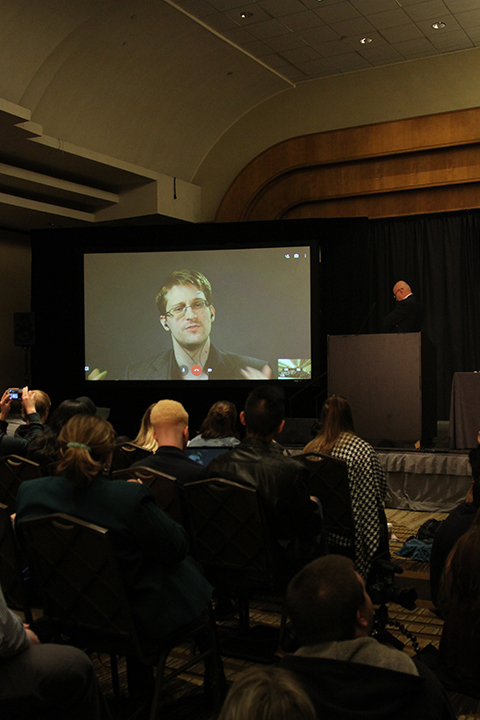By Molly Atchison | Opinion Editor
WASHINGTON – Edward Snowden is a hunted man, hiding away while he waits for America to determine if he should be vilified or honored for his actions against the U.S. government. On Saturday, Lariat representatives had the opportunity to listen to him speak to the Associated Collegiate Press (ACP) at its convention in Washington. He shared his experiences working with journalists, his beliefs about a journalist’s role in the U.S. and responded to audience questions.
In 2013, Snowden traveled to Hong Kong with a secret — he was carrying highly classified government information and was about to deliver it to journalists who would share it with the world. Snowden, a former National Security Administration (NSA) technology specialist, discovered that the NSA had been requiring service providers to release personal information about American citizens on a daily basis. When Snowden passed this information to Laura Poitras, a filmmaker and journalist for the U.K. Guardian, he became an international whistleblower and a target of U.S. outrage.
Since 2013, Snowden has been living in Russia to avoid extradition and prosecution from the U.S., where he would be the fourth person in recent years to be prosecuted under the Espionage Act. An active member of the online community, he has nearly 2.5 million followers on Twitter and is an ardent supporter of free speech as a board member of the Freedom of the Press Foundation.
“When I started interacting with the press more, I gained privacy back,” Snowden said.
His startling ability to communicate with U.S. citizens despite the adversity he faces allows him to continue to connect to the media, as he did at the ACP conference last weekend.
Snowden’s speech outlined his personal narrative while focusing on the impact journalists had on his decision to reveal stolen government information. He shared valuable advice with the student journalists in attendance and answered audience questions as well.
“You guys have the potential to help determine what is actually happening in our world.” Snowden said. “Don’t allow yourself or your stories or the focus of your investigations to be distracted by personalities.”
Snowden also spoke on the topic of government censorship, sharing his opinions about the way his former employers repeatedly denied any illegal observation into citizens’ personal lives and included videos that substantiated his argument. In his speech, he repeatedly returned to the concept that the violation of an individual’s rights is not supposed to be easy and that the government has tried too hard to justify spying on the American people.
Southern Methodist University senior Alicia Smiley found Snowden’s speech fascinating.
“It was interesting to note that he seemed to wonder aloud why people wanted to know more about him rather than the story itself …. I don’t think he understands why we are interested in him as a person, saying that he was something along the lines of ‘just a high school dropout,’ but that completely undermines his intelligence,” Smiley said.
Snowden stated several times that if he could repeat his actions again he would, even though it means his own life has suffered because of his choices.
“I don’t know if I’ll ever be able to come home,” he said. “If I return to the U.S., my life will never be the same.”
Snowden ended his poignant speech by encouraging the student journalists in the room to carefully analyze what they absorbing in the media.
“If you only read things you agree with, you stop growing. You’re not educating yourself,” Snowden said.
This article was edited 10/27/16. The headline was changed to better reflect Snowden’s roll in the leaks.






